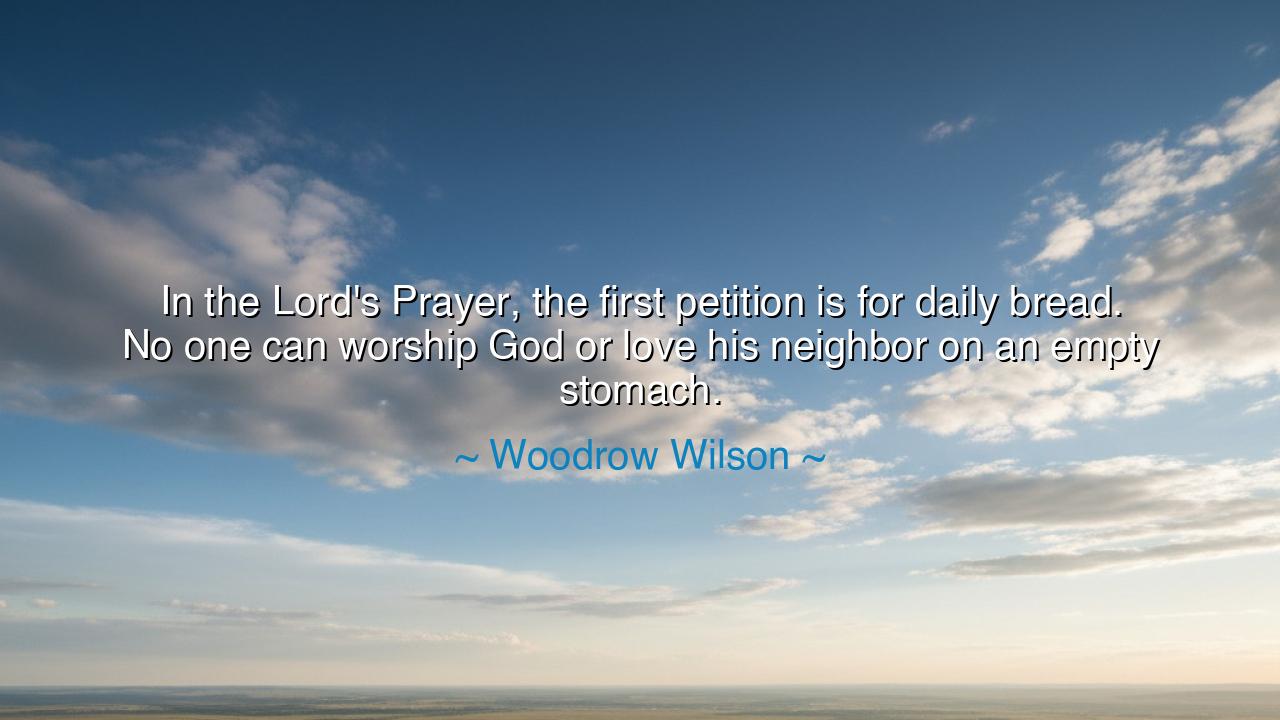
In the Lord's Prayer, the first petition is for daily bread. No
In the Lord's Prayer, the first petition is for daily bread. No one can worship God or love his neighbor on an empty stomach.






“In the Lord’s Prayer, the first petition is for daily bread. No one can worship God or love his neighbor on an empty stomach.” — Thus spoke Woodrow Wilson, the twenty-eighth President of the United States, a man of both vision and conviction, who sought to weave moral purpose into the fabric of governance. His words resound with the wisdom of both prophet and pragmatist: that spiritual devotion cannot thrive without physical sustenance, and that the love of God and the love of man are bound to the same truth — that hunger destroys the spirit as surely as it weakens the flesh.
In these few lines, Wilson captures the eternal unity between faith and compassion, between the bread that nourishes the body and the grace that nourishes the soul. The Lord’s Prayer, taught by Christ Himself, begins not with grandeur or glory, but with a humble plea: “Give us this day our daily bread.” Before one can ask for forgiveness, for deliverance, or for strength, one must first ask for the simplest of gifts — the food to survive. This order is no accident, but divine design. For God, in His wisdom, knows that the hungry cannot pray sincerely, nor the starving love generously. A man who trembles with emptiness cannot lift his heart to heaven until his body is first restored.
Wilson, who led his nation through the trials of the First World War, understood this truth not merely as theology, but as policy. He saw the wreckage of Europe — nations broken, people starving, children gaunt with hunger — and knew that no treaty, no ideal of peace, could endure while the stomachs of men lay hollow. He urged that food and mercy must come before politics, that before rebuilding empires, one must rebuild the human spirit through compassion. “No one,” he said, “can worship God or love his neighbor on an empty stomach.” Thus, his faith met his duty as a leader: to remind the world that charity begins not in lofty words, but in the bread shared among the suffering.
This truth has echoed across the ages. The prophets of Israel cried it aloud when they condemned those who prayed loudly in the temple but let the poor starve at their gates. Christ Himself fed the multitudes before teaching them, for He knew that truth falls on deaf ears when the body cries out in pain. Even in our own time, this truth remains unchanging: there can be no peace without provision, no righteousness without compassion. The holiest prayer is not only spoken in churches but performed at the table when one breaks bread with the hungry.
Consider the story of Mother Teresa, who walked the streets of Calcutta feeding the destitute and the dying. She once said, “If you can’t feed a hundred people, then feed just one.” Her work, like Wilson’s words, revealed the divine truth that worship without mercy is hollow. To lift a man from the dust, to offer him bread and dignity, is itself an act of praise. She did not preach theology to the starving; she fed them first — and in that act, they saw the face of God.
Wilson’s words also serve as a warning to every age of comfort: that luxury breeds blindness when it forgets the hunger of others. Too often, men speak of morality while ignoring misery, building churches of stone but not of spirit. Yet true worship does not lie in ritual, but in compassion — in ensuring that no one must choose between faith and survival. A just society, like a just soul, must begin with the simplest act of love: to ensure that every man has bread for the day and hope for the night.
Therefore, my children, let this teaching dwell in your hearts: faith without compassion is barren, and worship without service is empty. When you pray for your daily bread, remember that it is not meant for you alone, but for all who hunger. The one who feeds another shares in the work of God Himself. Let your prayers be matched with deeds; let your gratitude be expressed in generosity. For only when the hungry are fed can the spirit of man rise to its true stature, and only then can he truly love his neighbor and his God.
So, remember the wisdom of Woodrow Wilson: the bread of the body and the bread of the spirit are one and the same in the sight of Heaven. Feed both, nourish both, and you will live in harmony with the divine order of creation. For to give bread is to give life, and to give life is to honor God — and that, above all, is the truest form of worship.






AAdministratorAdministrator
Welcome, honored guests. Please leave a comment, we will respond soon